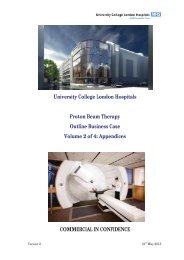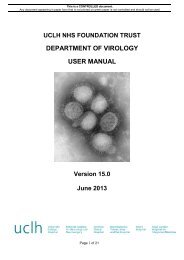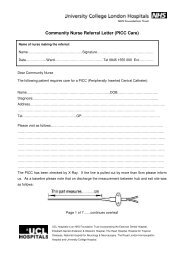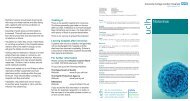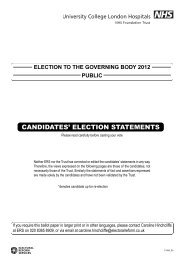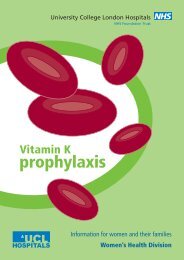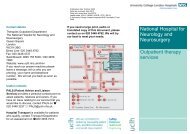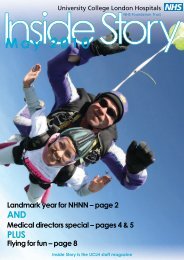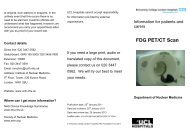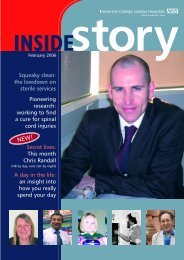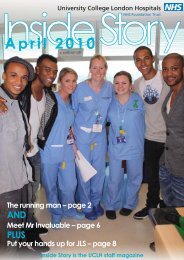Wardlines newsletter - Autumn 2012 - University College London ...
Wardlines newsletter - Autumn 2012 - University College London ...
Wardlines newsletter - Autumn 2012 - University College London ...
You also want an ePaper? Increase the reach of your titles
YUMPU automatically turns print PDFs into web optimized ePapers that Google loves.
Red Cell Group<br />
The Red Cell group is a pro-active group which meets to<br />
improve the ‘Red Cell Experience’ within in haematology<br />
Unit at UCH.<br />
The group has a long history and since 1989 has been<br />
instrumental in supporting the red cell patients through the<br />
huge expansion of Day Care in the Rosenheim Building and<br />
now in the new Cancer Centre. Services for red cell patients<br />
have continued to improve, in which the group is proud to<br />
have played a constant role.<br />
Red Cell patients are those with Thalassaemia, Sickle Cell<br />
Disease and hereditary Haemochromatosis. The Red Cell<br />
Group meets every three to four months. For information<br />
about meetings please contact 020 3447 7372.<br />
The Cotton Rooms<br />
by Clare Evans, Ambulatory Care Sister<br />
The new patient hotel named The Cotton<br />
Rooms is now open for business and has<br />
already been proved to be a success from<br />
recent feedback by patients who have<br />
resided there. The hotel has been built<br />
to a 4* specification and is owned by<br />
UCLH Charity, it is available for use by all<br />
patients that require hotel accommodation, such as those receiving<br />
treatment in Ambulatory Care.<br />
Patients in Ambulatory Care are currently the prime users of the<br />
hotel and have expressed their views which have been very positive.<br />
Already the hotel has made a great impact on the service as it has<br />
been designed with patients in mind and because we have a good<br />
working relationship with their staff, allowing patients views to be<br />
shared. The hotel manager and staff have been incredibly open to<br />
such views and have already taken many on board, altering the<br />
service where possible to better the experience. One example being<br />
they bought hooks that specially fit to the shower rail so patients<br />
can hang their chemotherapy backpacks to them, rather than having<br />
to place them on the floor as they did when using the preceding<br />
hotels.<br />
Having a hotel close to the Cancer Centre also has its benefits as it<br />
allows patients to pop back in between their treatments throughout<br />
the day, rather than wait around which is often unnecessary and<br />
boring for them! It has a dining room, a lounge area and a laundry<br />
room in addition to their individual bedrooms. Also installed are<br />
panic alarms which alert the hotel reception, this provides<br />
reassurance to patients should they feel suddenly unwell and don’t<br />
have someone staying with them. They know how to use this system<br />
and the reception staff can call Ambulatory care for advice or an<br />
ambulance where necessary, meaning that assistance is never far<br />
away.<br />
UCLH Charity said “We took lots of advice from the clinical staff -<br />
people like Paula Statham - so that we could build in as many<br />
useful features as possible to help patients. But it’s great to hear<br />
that our hotel staff are still listening to patients to make things<br />
even better.”<br />
The hotel has proven to be a great success and can only benefit the<br />
overall experience for our patients here at UCLH.<br />
In-patient Physiotherapy in<br />
haematology<br />
By Stuart Spear, Physiotherapist<br />
As physiotherapists working on the haematology wards at UCLH,<br />
our role is to ensure that our patients have access to appropriate<br />
levels of rehabilitation and support during their in-patient stay.<br />
Patients can often become debilitated and deconditioned, not only<br />
due to their illness but also the side effects of treatment that they<br />
are receiving. This not only has an effect on their physical condition<br />
but also their psychological wellbeing, both of which exercise is<br />
proven to benefit.<br />
Physiotherapy takes a holistic approach in enabling patients to<br />
maintain or regain strength, movement, endurance and functional<br />
independence. We aim to provide simple tailored exercise<br />
programmes to appropriate patients during their stay. These<br />
programmes may include exercises such as: mini squats, heel<br />
raises and balance exercises and the use of mini cycles, steps,<br />
ankle weights and dumbbells enable us to provide a much more<br />
varied and motivating programme. Many of our patients find stairs<br />
a challenge after their inpatient admission, so the provision of a<br />
small gym step in their rooms can be used to imitate this activity.<br />
We are aware that patients often go through a tough time here in<br />
hospital and appreciate that rest is an important element of the<br />
recovery pathway. Fatigue is one of the more prominent issues<br />
patients report and can be a huge barrier to daily function. Trying<br />
to get a balance between rest and progressive activity is essential<br />
in the management of fatigue. This is why empowering patients<br />
by letting them direct their own management is central to our<br />
treatment approach and because of this we hope that patients feel<br />
more in control of their recovery.<br />
Working in this specialist area is both challenging and immensely<br />
rewarding, and our aim is to provide the best possible quality of<br />
care to our patients. Thanks to those who have donated funds to<br />
expand our physiotherapy equipment.<br />
Stuart Spear, Carlton Thomas, Jenny Appleby, Katherine Elliot<br />
Holloway Road Waitrose<br />
We are one of the three charities of the month in October in the<br />
Holloway Road branch of Waitrose. Shoppers are given green<br />
chips to slot in one of three charity boxes. Waitrose donates<br />
£1000 per month to charities, which is split according to the<br />
amount of chips in each box. Anyone visiting this branch, slot<br />
a green chip into our fund please?<br />
4 • <strong>Autumn</strong> <strong>2012</strong> • <strong>Wardlines</strong>



